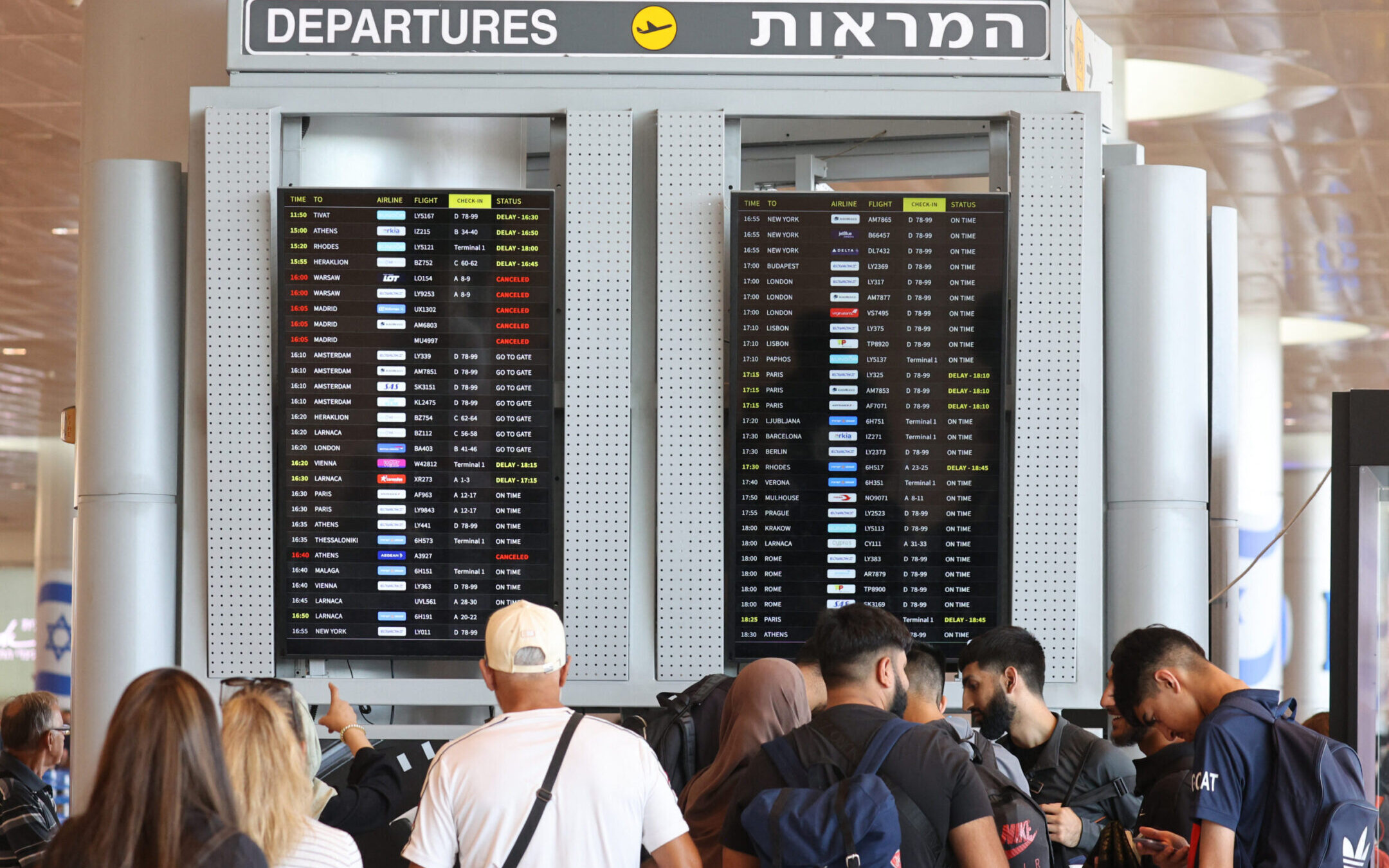With major airlines scrapping flights, getting to and from Israel has become a costly, often madcap endeavor
The threat of retaliation by Iran has caused weeks of cancelations, with no end in sight

Passengers check their flights at Ben Gurion Airport near Tel Aviv, on Aug. 6, 2024, amid regional tensions during the ongoing war between Israel and the Palestinian Hamas movement in the Gaza Strip. (Gil Magen-Cohen/AFP via Getty Images)
(JTA) — Adi Livne was vacationing in Spain when news broke of the assassination of Hamas leader Ismail Haniyeh in Iran. Her flight back home to Israel on a European budget airline was among many that were canceled as tensions escalated and skies cleared amid reports of an imminent Iranian retaliatory strike.
Stranded in Spain and scrambling to find a way home, she realized that only Israeli carriers were a reliable option. But Israel’s national airline, El Al, was charging a whopping $1,000 for a one-way ticket from Madrid to Tel Aviv, and she turned it down.
Unable to find a less expensive option, she ended up settling for a similarly expensive ticket with the Israeli carrier Israir. It is scheduled to leave Barcelona on Sunday.
Weeks after the assassination and with threats of retaliation still present, travel to and from Israel remains challenging. Many airlines have made cancellations on short notice or suspended routes altogether because of the security situation. United Airlines, one of the main carriers connecting Israel and the United States, has suspended service to Israel indefinitely. American Airlines canceled flights and said it won’t resume service any earlier than April 2025.
The high prices of the scarce tickets available on El Al, which famously flies to its home country even when other airlines do not, has generated resentment among people like Livne, who hoped for different conduct from their national airline.
“El Al is really price-gouging and taking advantage of the lack of competition,” Livne said. “It’s pretty ugly to exploit a crisis like that. It’s not something I would have expected, given the Israeli sense of solidarity.”
El Al appears to have calculated that it’s best to stay quiet for now, reportedly saying it is not granting interviews at this time. But wartime appears to have so far spelled good business for the company, which on Thursday reported record quarterly profits of $147.7 million for the months of April to June.
It will take a few months before the company reports its financial performance for the current period, but it appears confident that it will continue to be flying a packed schedule. On the same day, El Al also announced a large fleet addition with an order placed for up to 31 Boeing 737 Max airplanes.
The recent wave of flight cancellations is the most sweeping since international carriers began suspending service after the start of the Israel-Gaza war on Oct. 7. It is creating anxiety akin to the feeling during the early days of the pandemic, when public health restrictions constrained travel between Israel and the rest of the world, causing some to worry whether connections between Israeli and Diaspora Jews would be attenuated.
Some of those concerns are rearing their heads again now, as scarce flights become prohibitively expensive for many and uncertainty about whether travel plans can be carried out may be scaring off some would-be fliers.
El Al, one of the only commercial airlines with anti-missile defense technology aboard, has emerged as the most reliable option, but it offers limited nonstop flights to Israel from U.S. destinations.
Silicon Valley, for example, has traditionally depended on United, the sole airline with direct flights from SFO to TLV. The suspension of flights is a major disruption to commerce between the two tech hubs, said Sharon Vanek, the executive director of the California Israel Chamber of Commerce.
“The lack of direct flights, together with the unstable situation in the Middle East, may lead to fewer face-to-face meetings, which are often crucial for building trust and closing deals, potentially weakening these international business ties,” Vanek wrote in an email to JTA.
Despite the challenges, many American Jews are determined to find a way to get to Israel. For some, that means making it to Europe and then finding the cheapest flight they can on an Israeli budget carrier.
Emily Pagano, for example, landed in Israel on Thursday, after a series of flights that started in Phoenix, Arizona, and passed through Athens. The purpose of her trip is to visit her 22-year-old daughter, who arrived a few days earlier for a volunteer program.
Pagano was determined to come because she wanted to support her daughter for being brave enough to volunteer in a country that news reports suggest could be bombed at any moment.
“It was very scary as a mother, sending my daughter into potential danger, but that’s nothing compared to what’s being faced by the parents whose children are being held hostage in Gaza,” she said.
A message from our Publisher & CEO Rachel Fishman Feddersen

I hope you appreciated this article. Before you go, I’d like to ask you to please support the Forward’s award-winning, nonprofit journalism so that we can be prepared for whatever news 2025 brings.
At a time when other newsrooms are closing or cutting back, the Forward has removed its paywall and invested additional resources to report on the ground from Israel and around the U.S. on the impact of the war, rising antisemitism and polarized discourse.
Readers like you make it all possible. Support our work by becoming a Forward Member and connect with our journalism and your community.
— Rachel Fishman Feddersen, Publisher and CEO





















